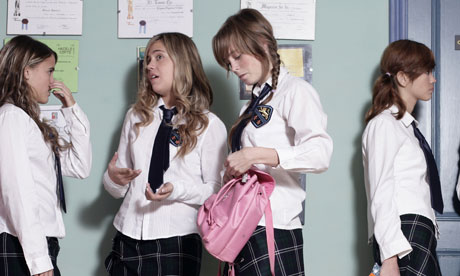
Look sharp, teenage girls of Britain: it's time to start guarding your honour, and Nadine Dorries MP is here to show you the way. The MP for Mid Bedfordshire introduced on Wednesday a 10-minute rule bill which would require schools to provide girls (yes, only girls) of 13-16 with "additional sex education [that] must include information and advice on the benefits of abstinence from sexual activity". It passed narrowly, by 67 to 61 – not enough to suggest that the bill has any hope of becoming legislation, but still 67 ill-informed people more than I'd like to see sitting in parliament.
Leaving aside for now the troubling assumption that it's only girls who need training in how to say no, what Dorries is ostensibly espousing is "abstinence plus": that is, sex and relationships education (SRE) that stresses the benefits of saying no while also teaching adolescents how to protect themselves if they do start having sex. In fact, as an SRE teacher, Alice Hoyle, stresses, good sex education already teaches children about saying no to anything they are not comfortable with or ready for: "Waiting until ready for sex is a central theme," Hoyle says.
The problem with Dorries's version of abstinence plus is that there's nothing much for it to be added to. Never mind requiring schools to provide additional sex education; at the moment they aren't required to provide any beyond the basics of human biology.
That doesn't mean schools don't do more, but what they offer is characterised by Dr Petra Boynton, a sex researcher from UCL, as "patchy": often delivered by non-specialists, rarely assessed, and without a guiding framework to ensure that the needs of children and parents are being met. Boynton adds: "Where practitioners and parents can struggle is giving young people the life skills to negotiate and discuss relationships – including saying no, and anticipating both the positive and negative things intimacy can bring."
When I got pregnant at 19, it wasn't for lack of warnings about the dire potential outcomes of intercourse: I'd had enough graphic discussions of STIs to put me right off cottage cheese (although not enough to deter me from actual sex, it turned out). The situation looks unlikely to improve as my own children go through school. In April 2010, plans to make SRE compulsory were ditched. Those supporting Dorries's bill can give themselves a paradoxical pat on the back: you all voted for a supplement to something that doesn't necessarily exist.
Despite appearing to ask for more education, Dorries's bill seems designed to make SRE sound like a terrifying exercise in depravity. She cites incidents so outrageous that no ethical teacher would endorse them. Condoms on bananas with seven-year-olds! Explicit sex vids in primary schools! Leaflets encouraging 11-year-olds to masturbate! (Actually the leaflet, distributed by the Centre for HIV and Sexual Health in Sheffield isn't aimed at children but intended to be used by educators as a guide to leading sex-positive discussion.)
It is perhaps unsurprising that 67 of our elected representatives decided that girls need to be taught to say no to all that muck. But why just girls? Boys can feel pressured into sex before they're ready. Boys suffer the consequences of early unplanned parenthood, albeit less directly than girls. Boys can contract STIs – in fact, boys who have sex with boys are particularly at risk of catching HIV. Shouldn't abstinence proponents be keen for boys to learn about the benefits of waiting too?
Apparently not, and that's the really offensive part of Dorries's 10-minute assault on sense and morals: instead of seeing children as individuals in need of individual advice and guidance, she strips them down to stereotypes – vulnerable girls who must be "told to say no" to the advances of those healthily lustful boys, or suffer the consequences. The bill might not be going anywhere, but the grim sexism it espouses is thoroughly alive, and a bad way to prepare children of either sex for the bumpy journey into adult relationships.

